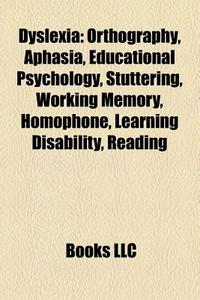
Dyslexia
Orthography, Stuttering, Working memory, Homophone, Learning disability, Reading, Phonological awareness, Developmental dyspraxia, Representational sy
- Editore:
Books LLC, Reference Series
- EAN:
9781156994290
- ISBN:
1156994292
- Pagine:
- 56
- Formato:
- Paperback
- Lingua:
- Inglese
Descrizione Dyslexia
Source: Wikipedia. Pages: 54. Chapters: Orthography, Stuttering, Working memory, Homophone, Learning disability, Reading, Phonological awareness, Developmental dyspraxia, Representational systems, Auditory processing disorder, Scotopic sensitivity syndrome, Speech and language pathology, Language development, Teaching reading: Whole Language and Phonics, Cluttering, Dyscalculia, Alternative therapies for developmental and learning disabilities, Characteristics of dyslexia, Kinesthetic learning, Functional disconnection, Irlen filters, Rapid Serial Visual Presentation, Alexia, Dybuster, Auditory learning, Rapid automatized naming, Reading comprehension for special needs, Attention versus memory in prefrontal cortex, Logographic cues, The Lewis School of Princeton, Strephosymbolia, Centre for Studies on Inclusive Education, Visual processing. Excerpt: Dyslexia is a broad term defining a learning disability that impairs a person's fluency or comprehension accuracy in being able to read, and spell, and which can manifest itself as a difficulty with phonological awareness, phonological decoding, orthographic coding, auditory short-term memory, and/or rapid naming. Dyslexia is separate and distinct from reading difficulties resulting from other causes, such as a non-neurological deficiency with vision or hearing, or from poor or inadequate reading instruction. It is believed that dyslexia can affect between 5 to 10 percent of a given population although there have been no studies to indicate an accurate percentage. There are three proposed cognitive subtypes of dyslexia: auditory, visual and attentional. Reading disabilities, or dyslexia, is the most common learning disability, although in research literature it's considered to be a receptive language-based learning disability. Accomplished adult dyslexics may be able to read with good comprehension, but they tend to read more slowly than non-dyslexics and may perform more poorly at nonsense word reading (a measure of phonological awareness) and spelling. Dyslexia is not an intellectual disability, since dyslexia and IQ are not interrelated as a result of cognition developing independently. Spoken language is a universal form of human communication. The visual notation of written language is not found in all cultures and is relatively new with regards to human evolution. There are many definitions of dyslexia but no official consensus has been reached. The World Federation of Neurology defines dyslexia as "a disorder manifested by difficulty in learning to read despite conventional instruction, adequate intelligence and sociocultural opportunity". MedlinePlus and the National Institutes of Health define dyslexia as "a reading disability resulting from the inability to process graphic symbols". The National Institute of Neurological Disorders and Stroke gives the foll





